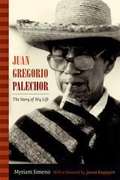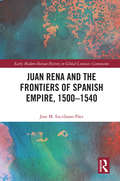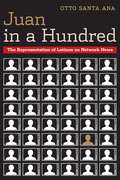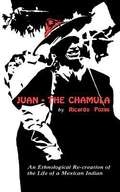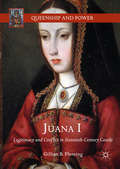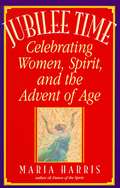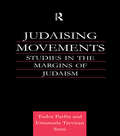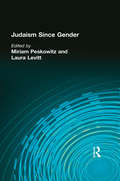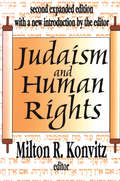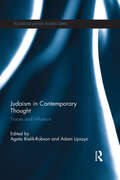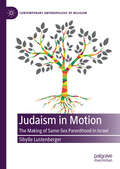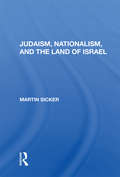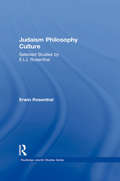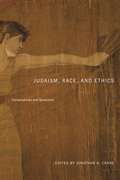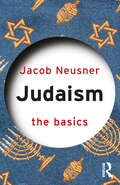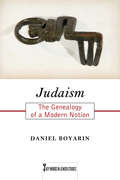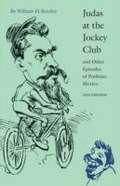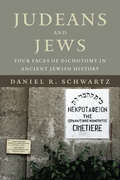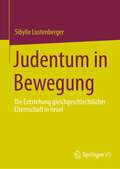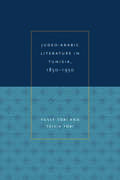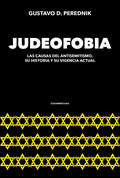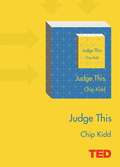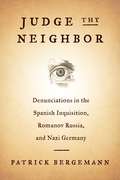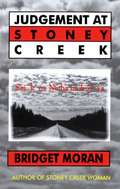- Table View
- List View
Juan Gregorio Palechor: The Story of My Life
by Andy Klatt Myriam JimenoThe Colombian activist Juan Gregorio Palechor (1923-1992) dedicated his life to championing indigenous rights in Cauca, a department in the southwest of Colombia, where he helped found the Regional Indigenous Council of Cauca. Recounting his life story in collaboration with the Colombian anthropologist Myriam Jimeno, Palechor traces his political awakening, his experiences in national politics, the disillusionment that resulted, and his turn to a more radical activism aimed at confronting ethnic discrimination and fighting for indigenous territorial and political sovereignty.Palechor's lively memoir is complemented by Jimeno's reflections on autobiography as an anthropological tool and on the oppressive social and political conditions faced by Colombia's indigenous peoples. A faithful and fluent transcription of Palechor's life story, this work is a uniquely valuable resource for understanding the contemporary indigenous rights movements in Colombia.
Juan Rena and the Frontiers of Spanish Empire, 1500–1540 (Early Modern Iberian History in Global Contexts)
by Jose M. Escribano-PáezThis book explores the political construction of imperial frontiers during the reigns of Ferdinand the Catholic and Charles V in the Iberian Peninsula and the Mediterranean. Contrary to many studies on this topic, this book neither focuses on a specific frontier nor attempts to provide an overview of all the imperial frontiers. Instead, it focuses on a specific individual: Juan Rena (1480–1539). This Venetian clergyman spent 40 years serving the king in several capacities while travelling from the Maghreb to northern Spain, from the Pyrenees to the western fringes of the Ottoman Empire. By focusing on his activities, the book offers an account of the Spanish Empire’s frontiers as a vibrant political space where a multiplicity of figures interacted to shape power relations from below. Furthermore, it describes how merchants, military officers, nobles, local elites and royal agents forged a specific political culture in the empire’s liminal spaces. Through their negotiations and cooperation, but also through their competition and clashes, they created practices and norms in areas like cross-cultural diplomacy, the making of the social fabric, the definition of new jurisdictions, and the mobilization of resources for war.
Juan in a Hundred: The Representation of Latinos on Network News
by Otto Santa AnaLatinos constitute the fastest-growing and largest ethnic minority in the United States, yet less than one percent of network news coverage deals with Latinos as the focus of a story. Out of that one percent, even fewer stories are positive in either content or tone. Author of the acclaimed Brown Tide Rising: Metaphors of Latinos in Contemporary American Public Discourse, Otto Santa Ana has completed a comprehensive analysis of this situation, blending quantitative research with semiotic readings and ultimately applying cognitive science and humanist theory to explain the repercussions of this marginal, negative coverage. Santa Ana's choice of network evening news as the foundation for Juan in a Hundred is significant because that medium is currently the single most authoritative and influential source of opinion-generating content. In his 2004 research, Santa Ana calculated that among approximately 12,000 stories airing across four networks (ABC, CBS, CNN, NBC), only 118 dealt with Latinos, a ratio that has remained stagnant over the past fifteen years. Examining the content of the stories, from briefs to features, reveals that Latino-tagged events are apparently only broadcast when national politics or human calamity are involved, and even then, the Latino issue is often tangential to a news story as a whole. On global events involving Latin America, U.S. networks often remain silent while BBC correspondents prepare fully developed, humanizing coverage. The book concludes by demonstrating how this obscurity and misinformation perpetuate maligned perceptions about Latinos. Santa Ana's inspiring calls for reform are poised to change the face of network news in America.
Juan the Chamula: An Ethnological Re-creation of the Life of a Mexican Indian
by Lysander Kemp Ricardo PozasThis book concerns an indigenous group of Tzotzil-speaking Indians living in the mountain highlands in the state of Chiapas in southern Mexico. It has been recognized as one of the most skillful handlings of Indian themes in Mexican literature.
Juana I: Legitimacy And Conflict In Sixteenth-century Castile (Queenship and Power)
by Gillian B. FlemingThis book examines the deep and lengthy crisis of legitimacy triggered by the death of Prince Juan of Castile and Aragon in 1497 and the subsequent ascent of Juana I to the throne in 1504. Confined by historiography and myth to the madwoman’s attic, Juana emerges here as a key figure at the heart of a period of tremendous upheaval, reaching its peak in the war of the Comunidades, or comunero uprising of 1520–1522. Gillian Fleming traces the conflicts generated by the ambitions of Juana’s father, husband and son, and the controversial marginalisation and imprisonment of Isabel of Castile’s legitimate heir. Analysing Juana’s problems and strategies, failures and successes, Fleming argues that the period cannot be properly understood without taking into account the long shadow that Juana I cast over her kingdoms and over a crucial period of transition for Spain and Europe.
Jubilee Time: Celebrating Women, Spirit, And The Advent Of Age
by Maria HarrisIn keeping with the bestselling When I Am an Old Woman I Shall Wear Purple, and Gail Sheehy's New Passages, Jubilee Time celebrates the freedom, opportunities, and power of older women, who are too often maligned in our youth-obsessed culture. Based on the Jubilee passage in Leviticus--"You shall hallow the fiftieth year. It shall be a Jubilee for you"--this practical and philosophical book helps women assess what values and beliefs they want to carry forward into the second half of life.A Jubilarian herself, Harris draws on her own experience and cites others--including May Sarton, Anne Morrow Lindbergh, M.F.K. Fisher, Florida Scott-Maxwell, Doris Grumbach, as well as more than one hundred "ordinary" women--to reflect the variety and vitality of this unheralded community. In lyrical prose punctuated by exercises and meditations, she invites readers to rest and reflect, stop and take stock, celebrate and cultivate the rich rewards of a mature spirituality.From the Trade Paperback edition.
Judaising Movements: Studies in the Margins of Judaism in Modern Times (Routledge Jewish Studies Series)
by Tudor Parfitt Emanuela Trevisan SemiThe history of Judaising movements has been largely ignored by historians of religion. This volume analyzes the interplay between colonialism, a Judaism not traditionally viewed as proselytising but which at certain points was struggling to heed the Prophets and become a light unto the Gentiles' and the attraction for many different peoples of the rooted historicity of Judaism and by the symbolic appropriation of Jewish suffering. This book will look at the role of colonialism in the development of Judaising movements throughout the world, including New Zealand, Japan, India, Burma and Africa. Particular attention will be paid to the Lemba tribe of Southern Africa. A remarkable parallel movement in 1930s Southern Italy will also be dealt with. The history of the converts of San Nicandro is seen in the context of currents of Jewish universalism, messianism and Zionism. Gender issues are also discussed here as the converted women assumed powers they had not hitherto enjoyed.
Judaism Since Gender
by Miriam Peskowitz Laura LevittJudaism Since Gender offers a radically new concept of Jewish Studies, staking out new intellectual terrain and redefining the discipline as an intrinsically feminist practice. The question of how knowledge is gendered has been discussed by philosophers and feminists for years, yet is still new to many scholars of Judaism. Judaism Since Gender illuminates a crucial debate among intellectuals both within and outside the academy, and ultimately overturns the belief that scholars of Judaism are still largely oblivious of recent developments in the study of gender. Offering a range of provocations--Jewish men as sissies, Jesus as transvestite, the problem of eroticizing Holocaust narratives--this timely collection pits the joys of transgression against desires for cultural wholeness.
Judaism and Human Rights
by Carlos RipollAreligion or a culture like Judaism, at least three thousand years old, cannot be expected to be all of one piece, homogeneous, self-contained, consistent, a neatly constructed system of ideas. If Judaism were that, it would have died centuries ago and would be a subject of interest only to the historian and archaeologist. Judaism has been a living force precisely because it is a teeming, thundering, and clamoring phenomenon, full of contrary tendencies and inconsistencies. Although there are no words or phrases in Hebrew Scriptures for "human rights," "conscience," or "due process of law," the ideals and values which these concepts represent were inherent in the earliest Jewish texts.This volume begins with four essays on the concept of man's being born "free and equal," in the image of God. The underpinning of this concept in Jewish law is explored in Section 2, entitled "The Rule of Law." Section 3, "The Democratic Ideal," traces the foundations of democracy in the Jewish teachings in the Bible and the Talmud, which in turn influenced the whole body of Western political thought. Relations between man and man, man and woman, employer and employee, slave and master are all spelled out. Section 4 presents essays analyzing man's freedom of conscience, and his God-given rights to dissent and protest. Section 5 deals with aspects of personal liberty, including the right of privacy. Section 6, entitled "The Earth is the Lord's," deals with the Jewish view of man's transient tenancy on God's earth, his obligations not to destroy anything that lives or grows, and to share the earth's bounty with the poor, the widowed, and the orphaned. Section 7 delivers an analysis of the "end of days" vision of Micah and man's continuing need to strive for peace and not for war. The volume concludes with three new essays, dealing with contemporary issues: "In God's Image: The Religious Imperative of Equality under Law"; "The Values of a Jewish and Democratic State: The Task of Reaching a Synthesis"; and "Religious Freedom and Religious Coercion in the State of Israel."This enlarged edition is accessibly written for a general and scholarly audience and will be of particular interest to political scientists, historians, and constitutional scholars.
Judaism in Contemporary Thought: Traces and Influence (Routledge Jewish Studies Series)
by Agata Bielik-Robson Adam LipszycThe central aim of this collection is to trace the presence of Jewish tradition in contemporary philosophy. This presence is, on the one hand, undeniable, manifesting itself in manifold allusions and influences – on the other hand, difficult to define, rarely referring to openly revealed Judaic sources. Following the recent tradition of Lévinas and Derrida, this book tentatively refers to this mode of presence in terms of "traces of Judaism" and the contributors grapple with the following questions: What are these traces and how can we track them down? Is there such a thing as "Jewish difference" that truly makes a difference in philosophy? And if so, how can we define it? The additional working hypothesis, accepted by some and challenged by other contributors, is that Jewish thought draws, explicitly or implicitly, on three main concepts of Jewish theology, creation, revelation and redemption. If this is the case, then the specificity of the Jewish contribution to modern philosophy and the theoretical humanities should be found in – sometimes open, sometimes hidden – fidelity to these three categories. Offering a new understanding of the relationship between philosophy and theology, this book is an important contribution to the fields of Theology, Philosophy and Jewish Studies.
Judaism in Motion: The Making of Same-Sex Parenthood in Israel (Contemporary Anthropology of Religion)
by Sibylle LustenbergerIn Israel, where the Orthodox rabbinate wields historically sanctioned influence over the legal definitions of marriage and parenthood, same-sex parenthood raises important questions such as what constitutes belonging to the national collective, who has the authority to define the norms of reproduction, and where the boundaries of Orthodox Judaism begin and end. Judaism in Motion addresses these questions from a transgenerational perspective that pays heed to how religiously informed rules, norms, and practices of transferring material properties, names, and societal belonging are adopted and transformed. It presents a detailed ethnographic account of the dynamic interaction between kinship, religion, and the state that complicates the commonly held assumption that places same-sex parenthood in a radically secular sphere that stands in stark opposition to Orthodox Judaism. Taking same-sex parenthood as a prism through which society at large is reflected, this volume further explores how transformations of societal structures take place, and what flexibility and leeway exist in organized religions.
Judaism, Nationalism, And The Land Of Israel
by Martin SickerThis book provides unique insights into the profound religious and cultural issues underlying the increasingly ideological divisions within Israeli society over the questions of territorial concessions and the future character of the state. It explores the significant distinctions between modern Zionism, a primarily secular nationalist movement modeled after the European movements of the nineteenth century, and the much older traditional Jewish nationalism, which is deeply rooted in ancient religion and culture. Dr. Sicker offers a concise overview of the 3,000-year intellectual history of Jewish nationalism, within which modern secular Zionism represents a relatively brief—although immensely important—interlude that may be entering its final stage as other more traditional religious nationalist concepts seek to take its place as the national ideology of the State of Israel. An analysis of how Jewish religious nationalism has shaped the history of the Jews, this book examines the national and territorial dimensions of classical Judaism, explains the survival of the nationalist idea despite the repeated loss of independence and the exile of the majority of the people from their homeland, and demonstrates how the nineteenth-century religious reform movement sought to counter both the growth of Zionism and the resurgence of traditional Jewish nationalism. The book concludes with a discussion of the new ideological synthesis of Judaism, nationalism, and the Land of Israel and its implications for the future of the Jewish state.
Judaism, Philosophy, Culture: Selected Studies by E. I. J. Rosenthal (Routledge Jewish Studies Series)
by Erwin RosenthalOne of the outstanding interpreters of Jewish culture in the twentieth century has been Erwin Rosenthal. This book contains some of his most influential work, ranging from the nature of Jewish political thought, both classical and medieval, to Christian reactions to Judaism and to varying approaches to the study of the Bible.
Judaism, Race, and Ethics: Conversations and Questions (Dimyonot)
by Jonathan K. CraneRecent political and social developments in the United States reveal a deep misunderstanding of race and religion. From the highest echelons of power to the most obscure corners of society, color and conviction are continually twisted, often deliberately for nefarious reasons, or misconstrued to stymie meaningful conversation. This timely book wrestles with the contentious, dynamic, and ethically complicated relationship between race and religion through the lens of Judaism. Featuring essays by lifelong participants in discussions about race, religion, and society— including Susannah Heschel, Sander L. Gilman, and George Yancy—this vibrant book aims to generate a compelling conversation vitally relevant to both the academy and the community. Starting from the premise that understanding prejudice and oppression requires multifaceted critical reflection and a willingness to acknowledge one’s own bias, the contributors to this volume present surprising arguments that disentangle fictions, factions, and facts. The topics they explore include the role of Jews and Jewish ethics in the civil rights movement, race and the construction of American Jewish identity, rituals of commemoration celebrating Jewish and black American resilience, the “Yiddish gaze” on lynchings of black bodies, and the portrayal of racism as a mental illness from nineteenth-century Vienna to twenty-first-century Charlottesville. Each essay is linked to a classic Jewish source and accompanied by guiding questions that help the reader identify salient themes connecting ancient and contemporary concerns.In addition to the editor, the contributors include Sander L. Gilman, Annalise E. Glauz-Todrank, Aaron S. Gross, Susannah Heschel, Sarah Imhoff, Willa M. Johnson, Judith W. Kay, Jessica Kirzane, Nichole Renée Phillips, and George Yancy.
Judaism, Race, and Ethics: Conversations and Questions (Dimyonot: Jews and the Cultural Imagination #8)
by Jonathan K. CraneRecent political and social developments in the United States reveal a deep misunderstanding of race and religion. From the highest echelons of power to the most obscure corners of society, color and conviction are continually twisted, often deliberately for nefarious reasons, or misconstrued to stymie meaningful conversation. This timely book wrestles with the contentious, dynamic, and ethically complicated relationship between race and religion through the lens of Judaism. Featuring essays by lifelong participants in discussions about race, religion, and society— including Susannah Heschel, Sander L. Gilman, and George Yancy—this vibrant book aims to generate a compelling conversation vitally relevant to both the academy and the community. Starting from the premise that understanding prejudice and oppression requires multifaceted critical reflection and a willingness to acknowledge one’s own bias, the contributors to this volume present surprising arguments that disentangle fictions, factions, and facts. The topics they explore include the role of Jews and Jewish ethics in the civil rights movement, race and the construction of American Jewish identity, rituals of commemoration celebrating Jewish and black American resilience, the "Yiddish gaze" on lynchings of black bodies, and the portrayal of racism as a mental illness from nineteenth-century Vienna to twenty-first-century Charlottesville. Each essay is linked to a classic Jewish source and accompanied by guiding questions that help the reader identify salient themes connecting ancient and contemporary concerns.In addition to the editor, the contributors include Sander L. Gilman, Annalise E. Glauz-Todrank, Aaron S. Gross, Susannah Heschel, Sarah Imhoff, Willa M. Johnson, Judith W. Kay, Jessica Kirzane, Nichole Renée Phillips, and George Yancy.
Judaism: The Basics (The Basics)
by Jacob NeusnerThe oldest of the world’s major faiths, Judaism as practiced today represents a tradition that goes back nearly 6,000 years. Accessible and wide-ranging, Judaism: The Basics is a must-have resource covering the stories, beliefs and expressions of that tradition. Key topics covered include: the Torah Israel – the state and its people Passover Reform Judaism, Orthodox Judaism and Zionism the impact of the Holocaust. With a glossary of terms and extensive suggestions for further reading, Judaism: The Basics is an essential guide through the rich intricacies of the Jewish faith and people.
Judaism: The Genealogy of a Modern Notion (Key Words in Jewish Studies #35)
by Daniel BoyarinJudaism makes the bold argument that the very concept of a religion of ‘Judaism’ is an invention of the Christian church. The intellectual journey of world-renowned Talmud scholar Daniel Boyarin, this book will change the study of “Judaism”—an essential key word in Jewish Studies—as we understand it today. Boyarin argues that although the world treats the word “Judaism” as appropriate for naming an alleged religion of the Jews, it is in fact a Christian theological concept only adopted by Jews with the coming of modernity and the adoption of Christian languages.
Judas at the Jockey Club and Other Episodes of Porfirian Mexico, Second Edition
by William H. BeezleyThis brilliant and eminently readable cultural history looks at Mexican life during the dictatorship of Porfirio Díaz, from 1876 to 1911. At that time Mexico underwent modernization, which produced a fierce struggle between the traditional and the new and exacerbating class antagonisms. In these pages, the noted historian William H. Beezley illuminates many facets of everyday Mexican life lying at the heart of this conflict and change, including sports, storytelling, healthcare, technology, and the traditional Easter-time Judas burnings that became a primary focus of the strife during those years. This second edition features a new preface by the author as well as updated and expanded text, notes, and bibliography.
Judeans and Jews
by Daniel R. SchwartzIn writing in English about the classical era, is it more appropriate to refer to "Jews" or to "Judeans"? What difference does it make? Today, many scholars consider "Judeans" the more authentic term, and "Jews" and "Judaism" merely anachronisms.In Judeans and Jews, Daniel R. Schwartz argues that we need both terms in order to reflect the dichotomy between the tendencies of those, whether in Judea or in the Disapora, whose identity was based on the state and the land (Judeans), and those whose identity was based on a religion and culture (Jews).Presenting the Second Temple era as an age of transition between a territorial past and an exilic and religious future, Judeans and Jews not only sharpens our understanding of this important era but also sheds important light on the revolution in Jewish identity caused by the creation of the modern state of Israel.
Judentum in Bewegung: Die Entstehung gleichgeschlechtlicher Elternschaft in Israel
by Sibylle LustenbergerIn Israel, wo das orthodoxe Rabbinat historisch sanktionierten Einfluss auf die rechtlichen Definitionen von Ehe und Elternschaft hat, wirft gleichgeschlechtliche Elternschaft elementare Fragen auf, wie zum Beispiel, was Zugehörigkeit zum nationalen Kollektiv schafft, wer die Autorität hat, die Normen der Reproduktion zu definieren, und wo das orthodoxe Judentum beginnt und endet. Judentum in Bewegung behandelt diese Fragen aus einer transgenerationalen Perspektive, die darauf achtet, wie religiös informierte Regeln, Normen und Praktiken der Weitergabe von materiellem Besitz, Namen und gesellschaftlicher Zugehörigkeit angewendet und verändert werden. Lustenberger präsentiert eine detaillierte ethnographische Beschreibung des dynamischen Zusammenspiels zwischen Verwandtschaft, Religion und Staat und hinterfragt damit die allgemein verbreitete Annahme, dass gleichgeschlechtliche Elternschaft in einer radikal säkularen Sphäre existiert, die im krassen Gegensatz zum orthodoxen Judentumsteht. Sie nimmt gleichgeschlechtliche Elternschaft als Prisma, durch die sich die Gesellschaft als Ganzes widerspiegelt, um zu untersuchen wie sich gesellschaftliche Strukturen verändern und welche Flexibilität und Spielraum organisierte Religionen dabei aufweisen.
Judeo-Arabic Literature in Tunisia, 1850-1950
by Tsivia Tobi Yosef TobiAs a result of the introduction of the printing press in the mid-nineteenth century and the proximity of European culture, language, and literature after the French occupation in 1881, Judeo-Arabic literature flourished in Tunisia until the middle of the twentieth century. As the most spoken language in the country, vernacular Judeo-Arabic allowed ideas from the Jewish Enlightenment in Europe (the Haskalah) to spread widely and also offered legitimacy to the surrounding Arab culture. In this volume, authors Yosef and Tsivia Tobi present works of Judeo-Arabic Tunisian literature that have been previously unstudied and unavailable in translation. In nine chapters, the authors present a number of works that were both originals and translations, divided by genre. Beginning each with a brief introduction to the material, they present translations of piyyutim (liturgical poems), malzumat (satirical ballads), qinot (laments), ghnayat (songs), essays on ideology and propaganda, drama and the theater, hikayat and deeds of righteous men (fiction), and Daniel Hagège's Circulation of Tunisian Judeo-Arabic Books, an important early critical work. A comprehensive introduction details the flowering of Judeo-Arabic literature in North Africa and appendixes of Judeo-Arabic journals, other periodicals, and books complete this volume. Ultimately, the authors reveal the effect of Judeo-Arabic literature on the spiritual formation of not only the literate male population of Tunisian Jews, who spent a good part of their time at the synagogue, but also on women, the lower and middle classes, and conservatives who leaned toward modernization. Originally published in Hebrew, Judeo-Arabic Literature in Tunisia, 1850-1950 will be welcomed by English-speaking scholars interested in the literature and culture of this period.
Judeofobia: Las causas del antisemitismo, su historia y su vigencia actual
by Gustavo Perednik¿Cuáles son los orígenes del odio antijudío? ¿Cuáles fueron sus motivaciones históricas y cuáles sus mitos fundantes? ¿Cuáles las causas de su persistencia? El odio a los judíos, la judeofobia, es uno de los más antiguos y persistentes de la historia. Desde los escritos de Alejandría y la expulsión de España hasta el cantonismo ruso y el Holocausto, es un fenómeno que ha atravesado todas las épocas y se manifiesta de formas diferentes, ora sutiles, ora brutales, todavía en nuestros días. Tanto los medios y la esfera pública como los ámbitos más privados y cotidianos son arena en la que a cada momento se despliega una miríada de prejuicios. ¿Cuáles son las peculiaridades de la judeofobia que hacen que emerja una y otra vez, incluso en los rincones menos esperados? En este libro indispensable, Gustavo Perednik responde esta y otras preguntas al tiempo que explora a fondo los orígenes, las motivaciones y los mitos fundantes de la hostilidad antijudía. Porque contra todo pronóstico optimista, nuestro siglo XXI sigue demandando una mirada alerta que oponga racionalidad reflexiva a la sinrazón demonizadora.
Judge This
by Chip KiddPart of the TED series: Judge This!First impressions are everything. They dictate whether something stands out, how we engage with it, whether we buy it, and how strongly we feel. This is especially true when it comes to design. And design is all around us, secretly shaping our world in ways we rarely recognise. Except if you yourself are a designer, like Chip Kidd. In Judge This, the reader travels through a day in the life of renowned designer Chip Kidd as he takes in first impressions of all kinds. We follow this visual journey with Kidd as he encounters and engages with everyday design, breaking down the good, the bad, the absurd and the brilliant as only a designer can. From the design of the paper you read in the morning to the subway ticket machine to the books you browse to the smartphone you use to the packaging for the chocolate bar you buy as an afternoon treat, Kidd will reveal the hidden secrets behind each of the design choices, with a healthy dose of humour, expertise and, of course, judgment as he goes. Kidd's observations on the power of first impressions resonate well beyond the objects he's examining. The simple (and often hilarious) wisdom he offers holds meaning for anyone in business, who needs to make a first impression on colleagues or customers. His visual tour of the world around him will hold and interest anyone with a sense of curiosity about popular culture, design and New York.
Judge Thy Neighbor: Denunciations in the Spanish Inquisition, Romanov Russia, and Nazi Germany (The Middle Range Series)
by Patrick BergemannFrom the Spanish Inquisition to Nazi Germany to the United States today, ordinary people have often chosen to turn in their neighbors to the authorities. What motivates citizens to inform on the people next door? In Judge Thy Neighbor, Patrick Bergemann provides a theoretical framework for understanding the motives for denunciations in terms of institutional structures and incentives.In case studies of societies in which denunciations were widespread, Bergemann merges historical and quantitative analysis to explore individual reasons for participation. He sheds light on Jewish converts’ shifting motives during the Spanish Inquisition; when and why seventeenth-century Romanov subjects fulfilled their obligation to report insults to the tsar’s honor; and the widespread petty and false complaints filed by German citizens under the Third Reich, as well as present-day plea bargains, whistleblowing, and crime reporting. Bergemann finds that when authorities use coercion or positive incentives to elicit information, individuals denounce out of self-preservation or to gain rewards. However, in the absence of these incentives, denunciations are often motivated by personal resentments and grudges. In both cases, denunciations facilitate social control not because of citizen loyalty or moral outrage but through the local interests of ordinary participants. Offering an empirically and theoretically rich account of the dynamics of denunciation as well as vivid descriptions of the denounced, Judge Thy Neighbor is a timely and compelling analysis of the reasons people turn in their acquaintances, with relevance beyond conventionally repressive regimes.
Judgement at Stoney Creek
by Bridget MoranJudgement at Stoney Creek has been released in a new edition of an aboriginal studies classic: an engrossing look at the investigation into the hit-and-run death of Coreen Thomas, a young Native woman in her ninth month of pregnancy, at the wheels of a car driven by a young white man in central BC. The resulting inquest into what might have been just another small-town tragedy turned into an inquiry of racial tensions, both implicit and explicit, that surfaced not only on country backroads but in the courtroom as well, revealing a dual system of justice that treated whites and aboriginals differently. First published in 1990, Judgement at Stoney Creek has been hailed for its moving and deeply personal depiction of a controversial subject that continues to make news today?how the justice system has failed Canada's aboriginal people. This new edition includes a new preface by the author, who returns to the area to discover how much racial relations, and the relationship between Natives and the justice system, have changed.
